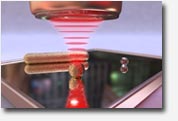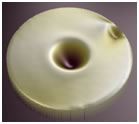
Cavity Quantum Optics Project:

Our team is exploring applications of optical micro- and nano-cavities in the fields of quantum optics with solid-state systems, optical sensing, microscopy, and spectroscopy.
We focus on a particularly promising cavity design which relies on micro-machined optical fibers. Using CO2 laser pulses, we create smooth concave profiles with very small radius of curvature on the endfacet of optical fibers. After application of high-reflective dielectric coatings, they serve as mirrors of a Fabry-Perot microcavity. Such cavities achieve a mode volume as small as a few wavelengths cubed and a Finesse (being proportional to the number of mirror reflections) of up to 170 000. Furthermore, they provide open access to the field maximum and full tuneability, which facilitates the achievement of optimal spectral and spatial overlap of the sample and the cavity mode.

We use these cavities and develop novel techniques to study a variety of different samples, including quantum emitters in diamond, nanoparticles, and molecular systems such as carbon nanotubes.
This research is a collaboration between Prof. Theodor W. Hänsch and Prof. David Hunger at KIT. Part of the team has moved to KIT Karlsruhe.
See our lab in a virtual tour on Nobel Labs 360°
http://nobellabs.lindau-nobel.org/gm_theodorhaensch/index.html
Current Projects

Cavity-enhanced single photon sources
We study solid-state based quantum emitters coupled to fiber cavities to improve single-photon emission properties and to realize an efficient spin-photon interface.
Read more ...

Scanning cavity microscopy
We develop ultra-sensitive imaging techniques based on signal enhancement in optical microcavities to study absorptive and dispersive properties of nanoscale samples.
Read more ...

Cavity-enhanced spectroscopy of single-walled carbon nanotubes
We develop cavity-enhanced Raman spectroscopy and absorption spectroscopy for the characterization of molecular systems.
Read more ...

Improved cavity fabrication & cavity characterization
We are continuously improving the fabrication and characterization of Fabry-Perot optical microcavities.
Read more ...
